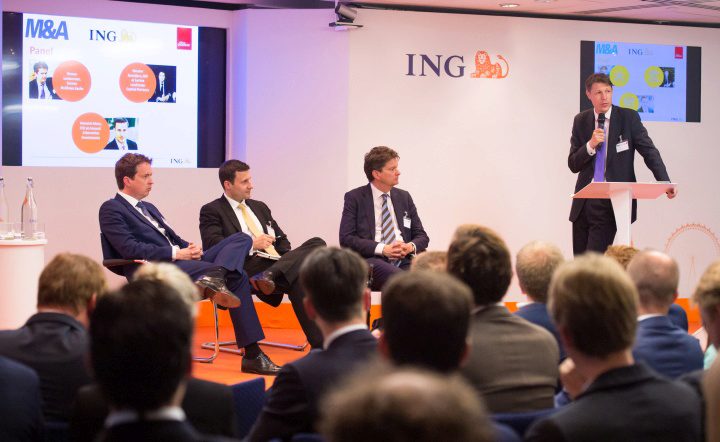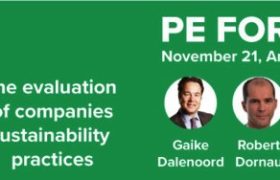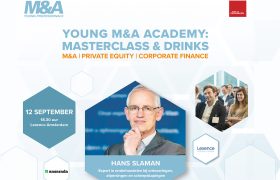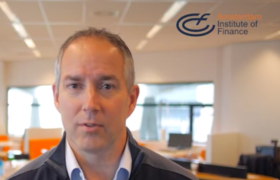Three types of investors comment on Brexit implications
Last modified: 20 juli 2023 12:31

Britons are heading for the polls. Oliver August, the financial editor of the Economist, moderated a panel discussion with three investors on the M&A Forum in Londen about Brexit scenario’s, rising populism and the future of London as a financial hub. Are we all lounging on the deck of the Titanic?
By Karima O’Flynn

The referendum about the UK leave is a two horse race. Even a small shift in perception in the media can make a significant difference to the outcome. And the results have huge implications. Moderator August (pictured right) noted the effect of an Brexit would impact more than just trade and investment. “Not least the fate of those 500,000 Europeans living and working in London”, he said. A few of the 500,000 were sitting in the audience on the M&A Forum last week at ING UK.
The quick, the thoughtful and the mixed investor
The three panel members used their different investment backgrounds to comment on the market implications of a Brexit scenario. Remco Lenterman is specialized in automated trading, and previously worked at IMC and Goldman Sachs. Since this week the market maker has started a new job at hedge fund Citadel.
The three panel members used their different investment backgrounds to comment on the market implications of a Brexit scenario. Remco Lenterman is specialized in automated trading, and previously worked at IMC and Goldman Sachs. Since this week the market maker has started a new job at hedge fund Citadel.

Wouter Snoeijers is a private equity manager at Levine Leichtman. And chief investment officer Heinrich Merz (pictured right) is responsible for the alternative assets unit at Amundi, one of the largest investment houses in Europe.
What are the contingency plans in preparation of Brexit?
The panel elaborated on contingency plans that are being undertaken in the market. Heinrich Merz said that apart from stresstests, the effects of the uncertainty, for example for UK financials and homebuilders, are being priced in the market, and that the preparation for directly after the vote will focus on managing volatility. He added that, as the UK is heavily reliant on foreign direct investments, a Brexit would make it acutely sensitive to an outflow of assets if this uncertainty caused businesses to take flight.
Wouter Snoeijers argued that is hard for private equity to predict any long term policy as investments are reliant on international trade. In addition, the close vote will fuel this European movement of nationalist sentiments and pushing for referenda to opt out or renegotiate membership terms. “How can one formulate a long term investment thesis in this situation? That is the question,” Snoeijers said.

Remco Lenterman predicted that the referendum will undoubtedly have an effect on London as a financial centre. Especially for firms relying on passport rights. He spoke from his own experience at Goldman Sachs: “It wasn’t until the single market for financial services was created in the early nineties that Goldman Sachs actively started recruiting employees in London.” Frankfurt and Paris would be the likely destinations for these firms, according to Lenterman. He also added that as the Norwegian model and the Swiss model were both rejected by the Brexit camp, the UK would be relying on a third country regime using bilateral agreements.
What is the future of the EU?
“Could Brexit bring about something greater than what we have now?” asked a hopeful audience member, perhaps desperate for some light at the end of the tunnel. Nope. The only people who are going to massively benefit from a Brexit are the City’s lawyers who will be stacking billable hours advising on all the legal effects of Brexit, agreed our panel. Merz remarked that the quick deals that Britain is going to secure according to the Leave camp are an illusion. “This is an emotional decision about sovereignty. The potential for misunderstanding from the people is high.”

“Local politicians around Europe have used the EU as a scapegoat for years”, argued Lenterman (pictured right). “It is really hard for them now turn around and really back the EU as a positive thing.” The panel agreed that the issue is also in the different ways that the UK and Europe view the European project. Europeans see the EU was a political project with economic benefits. And for the UK it’s the other way around: an economic project with some political benefits. “The thing that Brussels could and should do is make a grand gesture to the European citizens, to show that they are listening and that their voice does matter. For a start, they could make the decision to axe the Strasbourg Parliament. The fact that we have two parliaments, in Brussels and in Strasbourg, is just not necessary.” It would be something that France would be vehemently opposed to, Lenterman admitted. “However, it would be a big move towards the people if Brussels would decide so.”
Snoeijers added his view: “This referendum is not about what it says on the cover. It is ultimately a populist movement fueled by a real and perceived growing inequality and a rejection of the elite.” Merz drew the focus to the clear correlation between voters position and region/education. “It is clear that the whole basis of the current referendum could be traced back to the Thatcherite and Reaganist policies; pushing a shift from manufacturing to services,” said Merz. “The people who felt the pain from these policies, are now inclined to vote Out.”
Snoeijers concluded: “To make the EU an acceptable vehicle for the people, they should feel that their vote matters. Unfortunately it’s just the Netherlands and the UK that are pushing for reforms. The main risk now is a movement towards further unraveling of the EU.”
Are we all boarding the Titanic?
Even though the masterclass was quite an eyeopener on the potential effects of Brexit, moderator August admitted that he didn’t sense any panic walking through the City on his way to ING. After all, the probability of Brexit and the potential unraveling of the EU seemed like the chance of a steam cruiser hitting an iceberg. “Are we the people lounging on the deck of the Titanic?” he wondered. We can only answer this question in retrospect when the circumstances that created the perfect storm are there to see for everyone.
In this well educated, international crowd the question on whether the UK should remain in the EU seemed to be a no brainer. But what does a more integrated Europe mean for ‘the man in the street’? The lack of politicians providing a clear answer to that question is the real problem. So agreed many of us toasting well deserved glasses of chilled French (?) wine after the masterclass.
See you next year at the next M&A forum in the City. Hopefully still in the EU, is the conclusion. At least from an M&A perspective.







